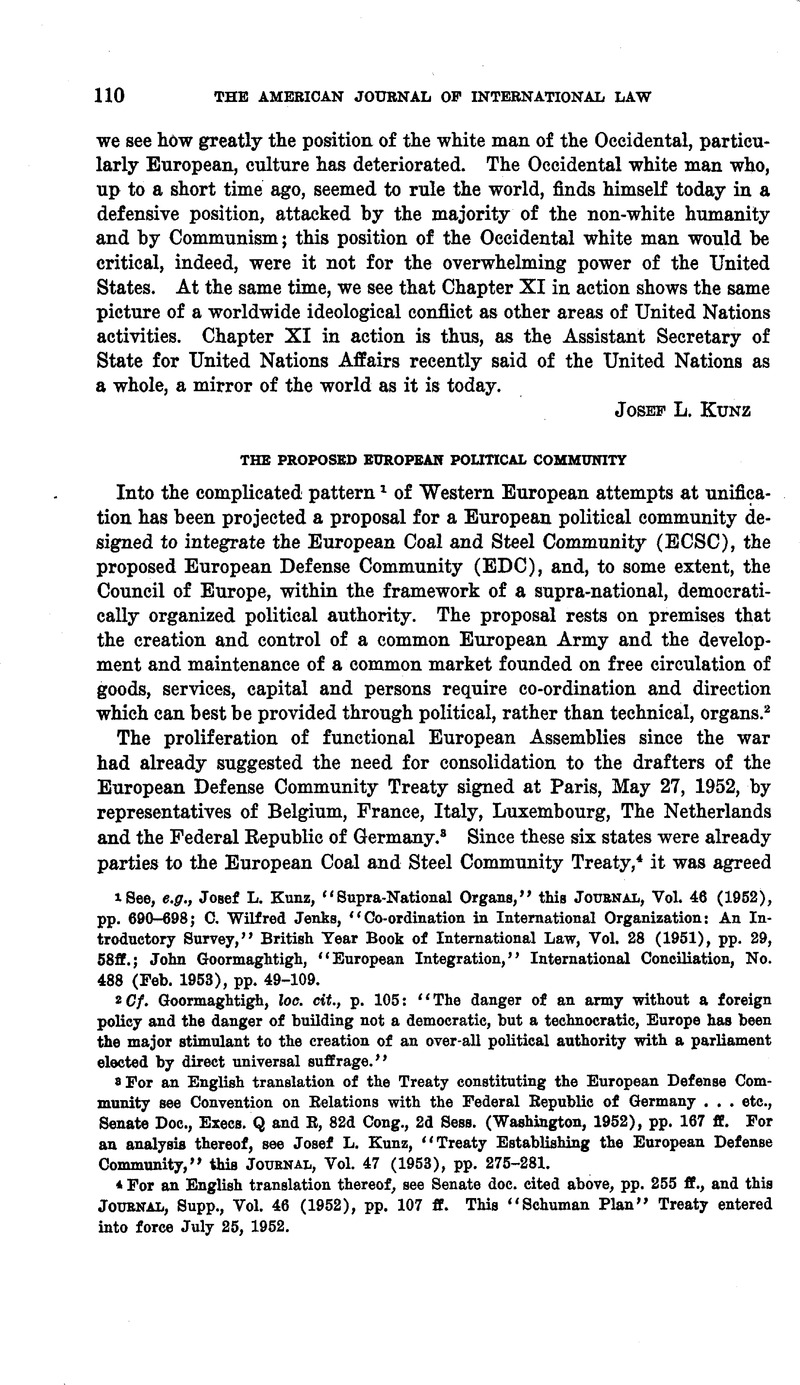Article contents
The Proposed European Political Community
Published online by Cambridge University Press: 30 March 2017
Abstract

- Type
- Editorial Comment
- Information
- Copyright
- Copyright © American Society of International Law 1954
References
1 See, e.g., Kunz, Josef L., “Supra-National Organs,” this Journal, Vol. 46 (1952), pp. 690–698 Google Scholar; Wilfred Jenks, C., “Co-ordination in International Organization: An Introductory Survey,” British Year Book of International Law, Vol. 28 (1951), pp. 29 Google Scholar, 58ff.; Goormaghtigh, John, “European Integration,” International Conciliation, No. 488 (Feb. 1953), pp. 49–109 Google Scholar.
2 Cf. Goormaghtigh, loc. cit., p. 105: “The danger of an army without a foreign policy and the danger of building not a democratic, but a technocratic, Europe has been the major stimulant to the creation of an over-all political authority with a parliament elected by direct universal suffrage.”
3 For an English translation of the Treaty constituting the European Defense Community see Convention on Relations with the Federal Republic of Germany … etc., Senate Doc, Execs. Q and E, 82d Cong., 2d Sess. (Washington, 1952), pp. 167 ff. For an analysis thereof, see Kunz, Josef L., “Treaty Establishing the European Defense Community,” this Journal, Vol. 47 (1953), pp. 275–281 Google Scholar.
4 For an English translation thereof, see Senate doc. cited above, pp. 255 ff., and this Journal, Supp., Vol. 46 (1952), pp. 107 ff. This “Schuman Plan” Treaty entered into force July 25, 1952.
5 See, for English text, Ad Hoc Assembly Instructed to work out a Draft Treaty setting up a European Political Community. Draft Treaty embodying the Statute of the European Community. Information and Official Documents of the Constitutional Committee, October 1952-April 1953 (Published by the Secretariat of the Constitutional Committee, Paris, 9 Quai Anatole-Prance, 1953. 179 pp.). The Draft Treaty appears as Document 10 of this collection. The original French text has been published as Doc. 15B of the ad hoc Assembly.
6 Ibid., pp. 149–151.
7 Ibid., pp. 48–51.
8 Cf. Hans Kelsen, The Law of the United Nations (1950), pp. 6–8, on the comparable phrases of the United Nations Charter.
9 I.C.J. Reports, 1948, p. 185; this Journal, Vol. 43 (1949), p. 598.
10 For example, Arts. 8, 13, 19, 23, 51, 75, 88 and 104, where the original French text stipulating that “une loi de la Communauté détermine” or “fixe” or “réglemente” something is uniformly translated in “the official English translation” as “the Community shall enact legislation.” For other references to legislation, see Arts. 20, 52–54, and 76.
11 Art. 54 provides that Parliament may also make recommendations “under the conditions and within the limits in which it is entitled to legislate”; but those conditions and limits are nowhere clearly expressed.
12 Cf. Art. 6: “The Community shall exercise all such powers and competence as are conferred upon it by the present Statute or by subsequent enactment.
“The provisions defining the powers and competence conferred upon the Community by the present Treaty shall be restrictively interpreted.”
The words “the present Statute” refer not only to “the present Treaty” but include also the provisions of the European Coal and Steel Community Treaty and the European Defense Community Treaty. Cf. Article 108.
13 See Arts. 20–25 of the Coal and Steel Community Treaty and Arts. 33–38 of the Defense Community Treaty.
14 See Vernon, Raymond, “The Schuman Plan: Sovereign Powers of the European Coal and Steel Community,” this Journal, Vol. 47 (1953), pp. 183–202 Google Scholar; van Eaalte, E., “The Treaty constituting the European Coal and Steel Community,” International and Comparative Law Quarterly, Vol. I, Pt. 1 (1952), pp. 73–85 CrossRefGoogle Scholar.
15 Supra, p. 114.
16 For text, see this Journal, Supp., Vol. 45 (1951), pp. 24–39.
17 On the nature of supra-national action, see Kunz, loc. cit.; van Raalte, loc. cit.; Vernon, loc. cit.
18 See Conférence pour la Communauté Politique Européenne, Rapport aux Ministres des Affaires Érang&res, Secretariat, Some, le 9 ootobre 195S, Doc. CIR/15 (47 pp. mimeographed, plus 2 annexes).
19 “… qu'aucun nouvel abandon de souveraineté ne devrait être consenti au premier stade.” Id., p. 3.
- 6
- Cited by


